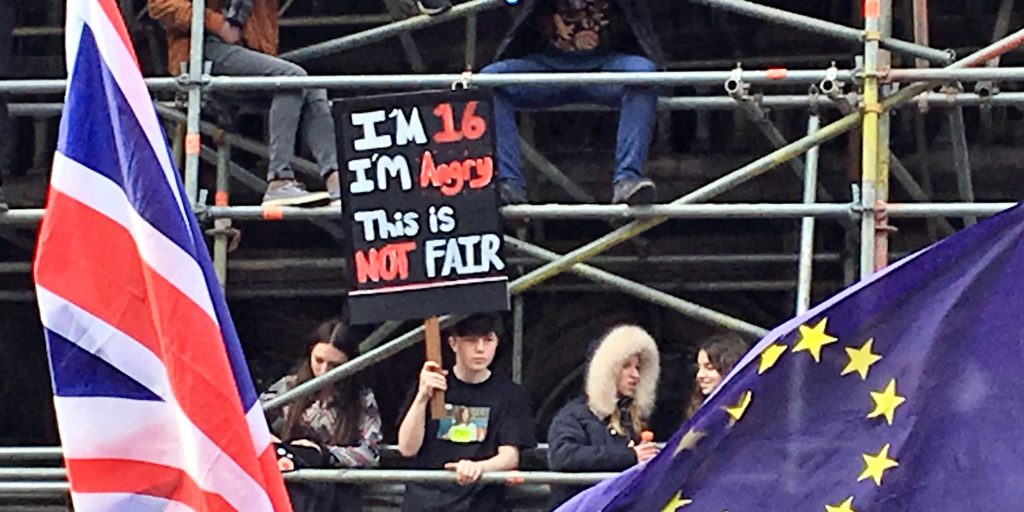Our student generation has been disenfranchised
The latest generation of university undergraduates has been excluded from participating in an issue that will shape their future, leaving the EU. Chris Game details how this came about, and how approaches to youth participation now divide the parties and the nations of the UK.

People’s Vote March – young people protest. Picture: TeaMeister/(CC BY 2.0) licence
This week, were I still a university degree convenor, I would be meeting and re-greeting the first three-year generation of undergraduates to have missed out almost entirely on voting in the referendum, the consequences of which will significantly shape their remaining lives – much longer lives than most of those who collectively created the narrow Leave majority in that 2016 EU referendum.
Then, come October, I would be lecturing to many of them – David Cameron’s timely memoir at hand – about the workings of UK government and explaining, early on, how institutionally this situation came about.
First would be context. How did EU membership, which five years ago, however badged – Common Market/EU/Europe/Single European Currency – just 8% of us considered ‘important’ in Ipsos MORI’s monthly Issues Index, become an apparently unavoidable subject for only the third UK-wide referendum in history?
Secondly, how did our quaint, uncodified, make-it-up-as-you-go-along British constitution allowed a hubristic Prime Minister to call a constitution-changing referendum with fewer conditions attached than their student bus passes? For Cameron, any plurality would do.
Any written national constitution would most likely have explicit written safeguards. Cameron still defends his rejection of, say, a 60% vote threshold, because Leavers, with their 51.9%, would have seen it as a ‘stitch-up’. Never mind Remainers, with their 48.1%. He could, though, simply have followed a turnout-based precedent, like that imposed by Parliament on the 1979 Scottish devolution referendum.
Then, a near-identical majority (51.6%) voted for a devolved Assembly, but Parliament’s hurdle required 40% of all registered electors to vote in favour for it to pass – hardly an outrageous figure for so momentous a decision. The 64% turnout, though, meant a full-electorate Yes vote of under 33%, and that first devolution bid failed.
The same formula applied to the higher 72% EU referendum turnout would have produced a 37% Leave vote – and changed history, and my student audience’s lives. For them, though, that’s barely the half of it.
Third topic, therefore, would be how two-thirds of their three-year student generation were deprived even of this say in their own futures by a collection of unelected, unaccountable, Lords (average age 70+), voting in what the Conservatives openly acknowledged was their own party’s perceived electoral interests.
To recap, the law had been changed to enable 16- and 17-year olds to vote in the 2014 Scottish independence referendum. And to no one’s great surprise, this cohort of probably the most politically aware and informed teenagers in history participated enthusiastically – moreover, in greater numbers than 18–24 year olds.
This created a problem for the Cameron government, when all parties but the Conservatives in the House of Lords voted for an amendment to lower the voting age similarly for the EU referendum. Yes, 16/17-year olds would probably vote disproportionately to Remain, but, much worse, it would be difficult to avoid later making the same concession for a general election – when many of this potentially 1.6 million might well vote other than Conservative.
After serious arm-twisting, therefore, the Lords’ vote was overturned by the Commons, with the Lords eventually acquiescing (the Conservatives aided by enough Crossbenchers) – in what then, if hardly by today’s standards, seemed a particularly cynical manoeuvre. Also excluded, as noted at the time and again in contrast to the Scottish referendum, were tax-paying EU citizens resident in the UK and longer-term British expats living in the EU, some of whom aired their material interests during the PM’s recent Luxembourg visit.
Even then the Lords’ coercion was called a disgrace, and, were a repeat contemplated in a second EU referendum – well, select your own noun. Personally, as someone with strong views on the issue but also a septuagenarian, I’d readily, were it legally allowable, have given my vote unconditionally to a 16/17-year old and would again.
Scotland subsequently – and unanimously, with the Ruth Davidson-led Conservatives changing their minds – extended the franchise for 16/17-year olds to the Scottish parliamentary and local elections, and Wales is following suit.
England and Northern Ireland aren’t, apparently reasoning that, despite being responsible enough to pay taxes, marry, enlist, and face criminal charges, you have to be 18 to grasp the complexities of voting in about the world’s most simplistic electoral system – and that, like 19th-century women, the way to develop their political maturity is to bar their participation.
We will obviously never know how, or how decisively, the 16/17-year olds might have voted in the referendum. There were certainly claims, usually based on somewhat questionable surveys, that the ‘result would have been Remain had votes been allowed at 16’. But crude arithmetic suggests otherwise. The gap between Leave and Remain was 1.27 million votes – which, incidentally, Cameron’s memoir insists on calling ‘only 600,000 votes in it’. In one specific sense – if a full 600,000+ Leavers had voted Remain – it’s true, but potentially misleading to the casual reader.
Assuming a two-thirds turnout – slightly higher probably than in a general election, because life-affecting causes energise teenagers more readily than party manifestos – a 70–75% Remain vote among 16- and 17-year olds would have cut the 1.27 million majority to probably under 500,000 or 1.5%. Even most Brexiteers might have hesitated to label this the ‘clear’, ‘conclusive’, ‘definitive’ Voice of the British People – initially anyway.
Not to worry. We know, thanks to NOP pollster supreme, Peter Kellner, that by mid-January this year the whole 1.27 million had disappeared anyway, at around 1,350 a day, through enough mainly Leave voters dying and enough mainly Remain young voters reaching voting age – and without a single 2016 Leaver changing their mind.
Currently, however, the odds against a second In/Out referendum this year (12/1) are enormously longer than on a general election (4/9 on). This is despite Boris Johnson’s failure to secure his 15 October date, carefully calculated to exclude significant numbers of potentially Labour-voting students who would fail to meet the 27 September registration deadline and be disinclined to journey home to vote.
That was one not-so-secret plan that backfired spectacularly, because it virtually guaranteed that university Welcome Weeks and Freshers’ Fairs everywhere will have their NUS/Electoral Commission ‘Got5?’ (minutes to register to vote) and partisan voter registration drives, social media campaigns, and even website information on whether their vote will be more effective in their university constituency or home address.
This article gives the views of the author, and not the position Democratic Audit.
You can find information on registering to vote – including specific advice for students – here: https://www.electoralcommission.org.uk/i-am-a/voter.
About the author

Chris Game is an Honorary Senior Lecturer at the Institute of Local Government Studies (INLOGOV) at the University of Birmingham.





 Democratic Audit's core funding is provided by the Joseph Rowntree Charitable Trust. Additional funding is provided by the London School of Economics.
Democratic Audit's core funding is provided by the Joseph Rowntree Charitable Trust. Additional funding is provided by the London School of Economics.
“The latest generation of university undergraduates has been excluded from participating in an issue that will shape their future”
Surely lots of young people, not just university undergraduates, have been excluded? I’m not sure what the cut-off age should have been, but I do think there’s a case to be made to have (temporarily) extended the franchise, given the importance of the referendum. Would 10 have been too young? 11? 12? 13? 14? 15? It’s almost as easy to make a poor decision as an adult as it is as a child. (But given the current system, perhaps parents could/should have informally canvassed their own children and voted accordingly?)